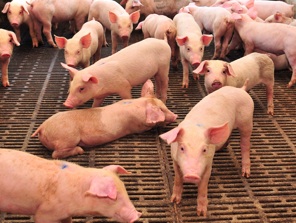
 June 18, 2008 — While consumers
June 18, 2008 — While consumers
are increasing demand for pork produced without antibiotics, more of
the pigs raised in such conditions carry bacteria and parasites
associated with food-borne illnesses, according to a new study.
June 18, 2008 — While consumers are increasing demand for pork produced without antibiotics, more of the pigs raised in such conditions carry bacteria and parasites associated with food-borne illnesses, according to a new study.
 A comparison of swine raised in antibiotic-free and conventional pork production settings revealed that pigs raised outdoors without antibiotics had higher rates of three food-borne pathogens than did pigs on conventional farms, which remain indoors and receive preventive doses of antimicrobial drugs.
A comparison of swine raised in antibiotic-free and conventional pork production settings revealed that pigs raised outdoors without antibiotics had higher rates of three food-borne pathogens than did pigs on conventional farms, which remain indoors and receive preventive doses of antimicrobial drugs.
“Animal-friendly, outdoor farms tend to have a higher occurrence of salmonella, as well as higher rates of parasitic disease,” said lead study author Wondwossen Gebreyes, associate professor of veterinary preventive medicine at Ohio State University .
More than half of the pigs on antibiotic-free farms tested positive for salmonella, compared to 39 percent of conventionally raised pigs infected with the bacterial pathogen. The presence of the Toxoplasma gondii parasite was detected in 6.8 percent of antibiotic-free pigs, compared to 1.1 percent of conventionally raised pigs. And two naturally raised pigs of the total 616 sampled tested positive for Trichinella spiralis, a parasite considered virtually eradicated from conventional U.S. pork operations.
Gebreyes noted that routine antibiotic use does not fully prevent the occurrence of salmonella bacteria even in conventional pig herds, as shown by the 39 percent of those pigs in this study that tested positive for the pathogen. By comparison, 54 percent of antibiotic-free pigs tested positive for salmonella.
Gebreyes won’t recommend one type of pork production practice over another.
“We are just doing the science and showing the results,” he said. “Does having an antibiotic-free and animal-friendly environment cause the re-emergence of historically significant pathogens? I think that is an extremely important question for consumers, policymakers and researchers to consider.”
The study is published in a recent issue of the journal Foodborne Pathogens and Disease .
The scientists tested pigs on farms in North Carolina, Ohio and Wisconsin. Of the total studied, 324 were raised in antibiotic-free systems and 292 lived on conventional farms. The researchers took blood samples to test for the presence of antibodies against bacterial and parasitic infections. The higher rates of infection on natural farms were consistent in all three geographic regions.
Of the three pathogens studied, the positive tests for the Trichinella roundworm surprised researchers the most. Gebreyes said federal inspectors might expect to find one positive test for the parasite among more than 14,000 pigs, so the two positive tests among 600 pigs were significant.
The nearly 7 percent of naturally raised pigs infected with Toxoplasma, while a relatively small number, still represented a significantly higher infection rate than that found in the conventional herds.
Gebreyes noted that routine antibiotic use does not fully prevent the occurrence of salmonella bacteria even in conventional pig herds, as shown by the 39 percent of those pigs in this study that tested positive for the pathogen. By comparison, 54 percent of antibiotic-free pigs tested positive for salmonella.
“The advantage of using antibiotics is to prevent these infections from occurring,” he said. “The disadvantage is it appears to create a favorable environment for strains of the bacteria that are resistant to antibiotics.
“On the other hand, when antibiotics are not used, the pigs tend to get less resistant bugs, but higher rates of the common bacteria of food safety concern. The prevalence of salmonella was significantly higher in the antibiotic-free herd than in the conventional herd. That could cause concern down the road about eating this product.”
The researchers theorized that naturally raised pigs’ exposure to moisture, vegetation and other animal species could contribute to their higher rates of pathogens. This study is part of a comprehensive examination of food safety issues related to pork production that includes testing pigs for a broader range of disease-causing organisms.